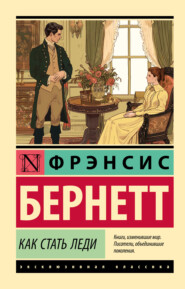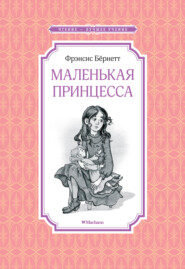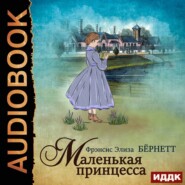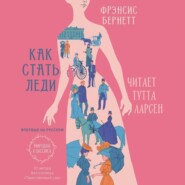По всем вопросам обращайтесь на: info@litportal.ru
(©) 2003-2024.
✖
A Little Princess: Being the whole story of Sara Crewe now told for the first time
Настройки чтения
Размер шрифта
Высота строк
Поля
“She is a doll I haven’t got yet,” she said. “She is a doll papa is going to buy for me. We are going out together to find her. I have called her Emily. She is going to be my friend when papa is gone. I want her to talk to about him.”
Miss Minchin’s large, fishy smile became very flattering indeed.
“What an original child!” she said. “What a darling little creature!”
“Yes,” said Captain Crewe, drawing Sara close. “She is a darling little creature. Take great care of her for me, Miss Minchin.”
Sara stayed with her father at his hotel for several days; in fact, she remained with him until he sailed away again to India. They went out and visited many big shops together, and bought a great many things. They bought, indeed, a great many more things than Sara needed; but Captain Crewe was a rash, innocent young man and wanted his little girl to have everything she admired and everything he admired himself, so between them they collected a wardrobe much too grand for a child of seven. There were velvet dresses trimmed with costly furs, and lace dresses, and embroidered ones, and hats with great, soft ostrich feathers, and ermine coats and muffs, and boxes of tiny gloves and handkerchiefs and silk stockings in such abundant supplies that the polite young women behind the counters whispered to each other that the odd little girl with the big, solemn eyes must be at least some foreign princess – perhaps the little daughter of an Indian rajah.
And at last they found Emily, but they went to a number of toy-shops and looked at a great many dolls before they finally discovered her.
“I want her to look as if she wasn’t a doll really,” Sara said. “I want her to look as if she listens when I talk to her. The trouble with dolls, papa” – and she put her head on one side and reflected as she said it – “the trouble with dolls is that they never seem to hear.” So they looked at big ones and little ones – at dolls with black eyes and dolls with blue – at dolls with brown curls and dolls with golden braids, dolls dressed and dolls undressed.
“You see,” Sara said when they were examining one who had no clothes. “If, when I find her, she has no frocks, we can take her to a dressmaker and have her things made to fit. They will fit better if they are tried on.”
After a number of disappointments they decided to walk and look in at the shop windows and let the cab follow them. They had passed two or three places without even going in, when, as they were approaching a shop which was really not a very large one, Sara suddenly started and clutched her father’s arm.
“Oh, papa!” she cried. “There is Emily!”
A flush had risen to her face and there was an expression in her green-gray eyes as if she had just recognized some one she was intimate with and fond of.
“She is actually waiting for us!” she said. “Let us go in to her.”
“Dear me!” said Captain Crewe; “I feel as if we ought to have some one to introduce us.”
“You must introduce me and I will introduce you,” said Sara. “But I knew her the minute I saw her – so perhaps she knew me, too.”
Perhaps she had known her. She had certainly a very intelligent expression in her eyes when Sara took her in her arms. She was a large doll, but not too large to carry about easily; she had naturally curling golden-brown hair, which hung like a mantle about her, and her eyes were a deep, clear, gray blue, with soft, thick eyelashes which were real eyelashes and not mere painted lines.
“Of course,” said Sara, looking into her face as she held her on her knee – “of course, papa, this is Emily.”
So Emily was bought and actually taken to a children’s outfitter’s shop, and measured for a wardrobe as grand as Sara’s own. She had lace frocks, too, and velvet and muslin ones, and hats and coats and beautiful lace-trimmed underclothes, and gloves and handkerchiefs and furs.
“I should like her always to look as if she was a child with a good mother,” said Sara. “I’m her mother, though I am going to make a companion of her.”
Captain Crewe would really have enjoyed the shopping tremendously, but that a sad thought kept tugging at his heart. This all meant that he was going to be separated from his beloved, quaint little comrade.
He got out of his bed in the middle of that night and went and stood looking down at Sara, who lay asleep with Emily in her arms. Her black hair was spread out on the pillow and Emily’s golden-brown hair mingled with it, both of them had lace-ruffled night-gowns, and both had long eyelashes which lay and curled up on their cheeks. Emily looked so like a real child that Captain Crewe felt glad she was there. He drew a big sigh and pulled his mustache with a boyish expression.
“Heigh-ho, little Sara!” he said to himself. “I don’t believe you know how much your daddy will miss you.”
The next day he took her to Miss Minchin’s and left her there. He was to sail away the next morning. He explained to Miss Minchin that his solicitors, Messrs. Barrow & Skipworth, had charge of his affairs in England and would give her any advice she wanted, and that they would pay the bills she sent in for Sara’s expenses. He would write to Sara twice a week, and she was to be given every pleasure she asked for.
“She is a sensible little thing, and she never wants anything it isn’t safe to give her,” he said.
Then he went with Sara into her little sitting-room and they bade each other good-by. Sara sat on his knee and held the lapels of his coat in her small hands, and looked long and hard at his face.
“Are you learning me by heart, little Sara,” he said, stroking her hair.
“No,” she answered. “I know you by heart. You are inside my heart.” And they put their arms round each other and kissed as if they would never let each other go.
When the cab drove away from the door, Sara was sitting on the floor of her sitting-room, with her hands under her chin and her eyes following it until it had turned the corner of the square. Emily was sitting by her, and she looked after it, too. When Miss Minchin sent her sister, Miss Amelia, to see what the child was doing, she found she could not open the door.
“I have locked it,” said a queer, polite little voice from inside. “I want to be quite by myself, if you please.”
Miss Amelia was fat and dumpy, and stood very much in awe of her sister. She was really the better-natured person of the two, but she never disobeyed Miss Minchin. She went down-stairs again, looking almost alarmed.
“I never saw such a funny, old-fashioned child, sister,” she said. “She has locked herself in, and she is not making the least particle of noise.”
“It is much better than if she kicked and screamed, as some of them do,” Miss Minchin answered. “I expected that a child as much spoiled as she is would set the whole house in an uproar. If ever a child was given her own way in everything, she is.”
“I’ve been opening her trunks and putting her things away,” said Miss Amelia. “I never saw anything like them – sable and ermine on her coats, and real Valenciennes lace on her underclothing. You have seen some of her clothes. What do you think of them?”
“I think they are perfectly ridiculous,” replied Miss Minchin, sharply; “but they will look very well at the head of the line when we take the school-children to church on Sunday. She has been provided for as if she were a little princess.”
And up-stairs in the locked room Sara and Emily sat on the floor and stared at the corner round which the cab had disappeared, while Captain Crewe looked backward, waving and kissing his hand as if he could not bear to stop.
CHAPTER II
A FRENCH LESSON
When Sara entered the school-room the next morning everybody looked at her with wide, interested eyes. By that time every pupil – from Lavinia Herbert, who was nearly thirteen and felt quite grown up, to Lottie Legh, who was only just four and the baby of the school – had heard a great deal about her. They knew very certainly that she was Miss Minchin’s show pupil and was considered a credit to the establishment. One or two of them had even caught a glimpse of her French maid, Mariette, who had arrived the evening before. Lavinia had managed to pass Sara’s room when the door was open, and had seen Mariette opening a box which had arrived late from some shop.
“It was full of petticoats with lace frills on them – frills and frills,” she whispered to her friend Jessie as she bent over her geography. “I saw her shaking them out. I heard Miss Minchin say to Miss Amelia that her clothes were so grand that they were ridiculous for a child. My mamma says that children should be dressed simply. She has got one of those petticoats on now. I saw it when she sat down.”
“She has silk stockings on!” whispered Jessie, bending over her geography also. “And what little feet! I never saw such little feet.”
“Oh,” sniffed Lavinia, spitefully, “that is the way her slippers are made. My mamma says that even big feet can be made to look small if you have a clever shoemaker. I don’t think she is pretty at all. Her eyes are such a queer color.”
“She isn’t pretty as other pretty people are,” said Jessie, stealing a glance across the room; “but she makes you want to look at her again. She has tremendously long eyelashes, but her eyes are almost green.”
Sara was sitting quietly in her seat, waiting to be told what to do. She had been placed near Miss Minchin’s desk. She was not abashed at all by the many pairs of eyes watching her. She was interested and looked back quietly at the children who looked at her. She wondered what they were thinking of, and if they liked Miss Minchin, and if they cared for their lessons, and if any of them had a papa at all like her own. She had had a long talk with Emily about her papa that morning.
“He is on the sea now, Emily,” she had said. “We must be very great friends to each other and tell each other things. Emily, look at me. You have the nicest eyes I ever saw, – but I wish you could speak.”
She was a child full of imaginings and whimsical thoughts, and one of her fancies was that there would be a great deal of comfort in even pretending that Emily was alive and really heard and understood. After Mariette had dressed her in her dark-blue school-room frock and tied her hair with a dark-blue ribbon, she went to Emily, who sat in a chair of her own, and gave her a book.
“You can read that while I am down-stairs,” she said; and, seeing Mariette looking at her curiously, she spoke to her with a serious little face.
“What I believe about dolls,” she said, “is that they can do things they will not let us know about. Perhaps, really, Emily can read and talk and walk, but she will only do it when people are out of the room. That is her secret. You see, if people knew that dolls could do things, they would make them work. So, perhaps, they have promised each other to keep it a secret. If you stay in the room, Emily will just sit there and stare; but if you go out, she will begin to read, perhaps, or go and look out of the window. Then if she heard either of us coming, she would just run back and jump into her chair and pretend she had been there all the time.”
“Comme elle est drôle!” Mariette said to herself, and when she went down-stairs she told the head housemaid about it. But she had already begun to like this odd little girl who had such an intelligent small face and such perfect manners. She had taken care of children before who were not so polite. Sara was a very fine little person, and had a gentle, appreciative way of saying, “If you please, Mariette,” “Thank you, Mariette,” which was very charming. Mariette told the head housemaid that she thanked her as if she was thanking a lady.
“Elle a l’air d’une princesse, cette petite,” she said. Indeed, she was very much pleased with her new little mistress and liked her place greatly.
After Sara had sat in her seat in the school-room for a few minutes, being looked at by the pupils, Miss Minchin rapped in a dignified manner upon her desk.
“Young ladies,” she said, “I wish to introduce you to your new companion.” All the little girls rose in their places, and Sara rose also. “I shall expect you all to be very agreeable to Miss Crewe; she has just come to us from a great distance – in fact, from India. As soon as lessons are over you must make each other’s acquaintance.”

















